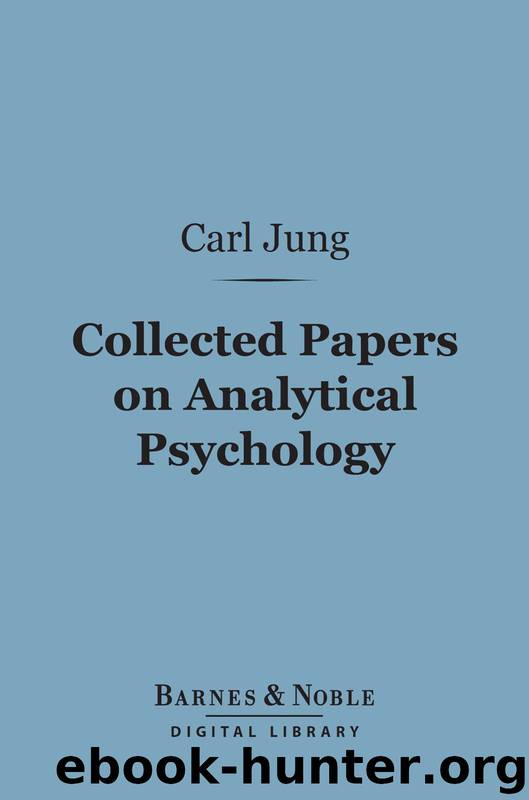Collected Papers on Analytical Psychology by Carl Jung

Author:Carl Jung [Jung, Carl]
Language: eng
Format: epub
ISBN: 9781411460164
Publisher: Barnes & Noble
The selfsame passion for truth possesses us both when we think of pure research, and the same desire to cure when we are considering therapy. For the scientist, as for the doctor, we desire the fullest freedom in all directions, fullest freedom to select and use the methods which promise the best fulfilment of their ends at any moment. Here we are at one; but there remains a postulate we must establish to the satisfaction of others if we want recognition for our views.
First and foremost there is a question that must be answered, an old question asked already in the Gospels: What is Truth? I think clear definitions of fundamental ideas are most necessary. How shall we contrive a working definition of the conception "Truth"? Perhaps an allegory may help us.
Imagine a gigantic prism extending in front of the sun, so that its rays are broken up, but suppose man entirely ignorant of this fact. I exclude the invisible, chemical and ultra-violet rays. Men who live in a blue-lit region will say: "The sun sends forth blue light only." They are right and yet they are wrong: from their standpoint they are capable of perceiving only a fragment of truth. And so too with the inhabitants of the red, yellow, and in-between regions. And they will all scourge and slay one another to force their belief in their fragment upon the others—till, grown wiser through travelling in each others' regions, they come to the harmonious agreement that the sun sends out light of varying colours. That comprehends more truth, but it is not yet the Truth. Only when a giant lens shall have re-combined the split-up rays and when the invisible, chemical and heat rays have given proof of their own specific effects, will a view more in accordance with the facts be able to arise, and men will perceive that the sun emits white light which is split up by the prism into differing rays with different peculiarities, which rays can be recombined by the lens into one mass of white light.
This example shows sufficiently well that the road to Truth leads through far-reaching and comparative observations, the results of which must be controlled by the help of freely chosen experiments, until well-grounded hypotheses and theories can be put forward; but these hypotheses and theories will fall to the ground as soon as a single new observation or experiment contradicts them.
The way is difficult, and in the end all man ever attains to is relative truth. But such relative truth suffices for the time being, if it serves to explain the most important actual concatenations of the past, to light up present problems, to predict those of the future, so that we are then in a position to achieve adaptation through our knowledge. But absolute truth could be accessible only to omniscience, aware of all possible concatenations and combinations; that is not possible, for the concatenations and their combinations are infinite. Accordingly, we shall never know more than an approximate truth.
Download
This site does not store any files on its server. We only index and link to content provided by other sites. Please contact the content providers to delete copyright contents if any and email us, we'll remove relevant links or contents immediately.
Rewire Your Anxious Brain by Catherine M. Pittman(17581)
Talking to Strangers by Malcolm Gladwell(11865)
The Art of Thinking Clearly by Rolf Dobelli(8836)
Mindhunter: Inside the FBI's Elite Serial Crime Unit by John E. Douglas & Mark Olshaker(7831)
Becoming Supernatural by Dr. Joe Dispenza(7100)
Change Your Questions, Change Your Life by Marilee Adams(6637)
Nudge - Improving Decisions about Health, Wealth, and Happiness by Thaler Sunstein(6629)
The Road Less Traveled by M. Scott Peck(6627)
The Lost Art of Listening by Michael P. Nichols(6465)
Enlightenment Now: The Case for Reason, Science, Humanism, and Progress by Steven Pinker(6404)
Win Bigly by Scott Adams(6306)
Mastermind: How to Think Like Sherlock Holmes by Maria Konnikova(6227)
The Way of Zen by Alan W. Watts(5790)
Daring Greatly by Brene Brown(5636)
Grit by Angela Duckworth(4729)
Big Magic: Creative Living Beyond Fear by Elizabeth Gilbert(4719)
Men In Love by Nancy Friday(4315)
Flow by Mihaly Csikszentmihalyi(4047)
The Four Tendencies by Gretchen Rubin(4018)
